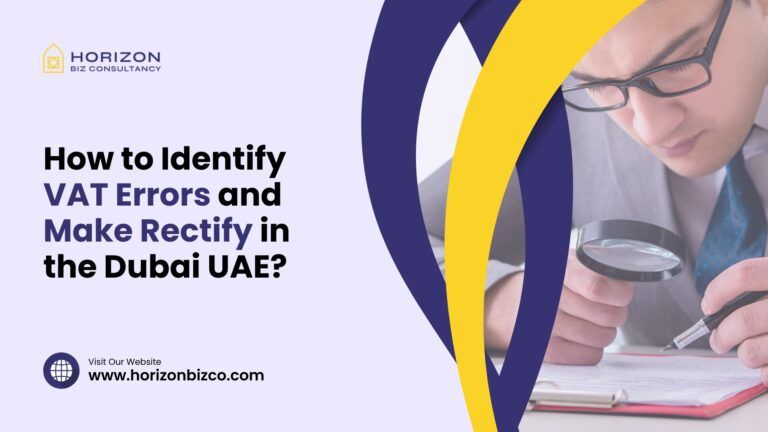Value Added Tax (VAT) was implemented in the United Arab Emirates (UAE) and across the Gulf Cooperation Council (GCC) in 2018. All companies in Dubai and the UAE must comply with VAT rules or face penalties, interest and other problems. But VAT can be complex, leading to common errors. This article will help businesses spot and rectify VAT mistakes.
Understanding VAT Basics is Crucial
To avoid VAT errors, firms must first comprehend key compliance requirements and regulations:
- Registration – Businesses exceeding the AED 375,000 threshold must register for VAT with the Federal Tax Authority (FTA)
- Taxable Supplies – VAT at 5% must be charged on all sales of goods and services unless specifically exempted
- Invoices – All tax invoices issued must contain certain details like VAT Registration Number, amount of tax, etc.
Having clarity on policies around zero-rated items, input tax credits and other concepts is also essential.
Most Common Types of VAT Errors
Many businesses unintentionally commit VAT mistakes. Common errors include:
1. Improper VAT Registration
Some companies that exceed the VAT registration threshold fail to register. Others register voluntarily when not eligible. Both are non-compliant. Penalties like the ‘Tax Evasion Fine’ can apply.
2. Incorrect VAT Calculations
Errors often occur in manually calculating 5% VAT on taxable goods and services. Rates get incorrectly applied leading to under or over payment of VAT.
3. Supply Classification Issues
Determining whether a particular sale is exempt, zero-rated or standard-rated causes confusion. Incorrect classification leads to charging incorrect VAT rates.
4. Problems Issuing Tax Invoices
Issuing invoices without all mandatory details like VAT registration number or breakdown of taxes is non-compliant.
5. Reporting Sales or Expenses Inaccurately
Errors occur when sales or purchases are reported incorrectly on VAT returns. This causes inaccurate input or output tax amounts.
How To Assess Your Compliance Through VAT Audits
The best way businesses can self-identify VAT errors is by conducting regular internal audits:
Step 1) Thoroughly review financial accounts using a VAT compliance perspective. Trace transactions to source documents.
Step 2) Identify high-risk areas like tax invoices, registration status, calculations. Use audit tests to quantify accuracy rate.
Step 3) If error rates exceed 2-4%, a full reconciliation is advised by amending past returns.
Step 4) Implement stronger internal controls around VAT to prevent future non-compliance.
Seeking expert help can also identify problem areas. Tax consultants can conduct VAT health checks and advise strategies to improve compliance.
Best Practices for Fixing VAT Errors
If businesses discover they have committed VAT mistakes, prompt action is advised:
1. Voluntary Disclosure
The FTA allows companies to voluntarily disclose past VAT errors and pay outstanding taxes without incurring some penalties. This requires filing revised returns.
2. Demonstrate Good Faith
If errors are unintentional and all taxes are paid voluntarily, penalties may still get reduced by demonstrating good faith compliance efforts.
3. Adjust Future Returns
For minor errors, adjust upcoming VAT returns accordingly to avoid amending multiple past ones. Maintain thorough reconciliation.
4. Seek Expert Assistance
Engage qualified VAT consultants to ensure proper compliance as amended returns get filed. Implement their recommendations for improving VAT procedures.
Getting Help from VAT Experts
Seeking services of VAT experts is highly recommended for businesses in the UAE:
Efficient Compliance Management – They ensure timely and accurate VAT treatment across all transactions.
VAT Health Checks – Diagnose problem areas and recommend fixes through audits/assessments.
Error Corrections – Assist with voluntarily disclosing errors to the FTA and revising past returns.
Tax Savings – Apply their knowledge of VAT rules to legally minimize your rates.
Choosing the right tax advisor can make VAT compliance smooth, avoid penalties, and optimize savings.
Conclusion
Meeting all VAT obligations in the UAE can be challenging but critically important. Non-compliance leads to financial and legal consequences for organizations. Equipping yourself to spot errors early and undertake corrective action is essential. Seeking expert assistance is highly advised. Staying continually up-to-date on evolving tax regulations is also vital for avoiding missteps. With the right VAT vigilance and help, businesses can steer clear of problems.
FAQ’S
Penalties depend on the type and severity of non-compliance. Fines, tax owed, and interest must usually be paid. Jail sentence in extreme tax evasion cases.
Mandatory VAT registration is required within 30 days of crossing the AED 375,000 threshold for taxable revenue over the last 12 months.
VAT invoices must include date, name/address, TRN numbers, description of goods/services, VAT amount, total value.
Yes, via the Voluntary Disclosure Program. Certain penalties get waived if outstanding taxes are paid and returns amended appropriately.





